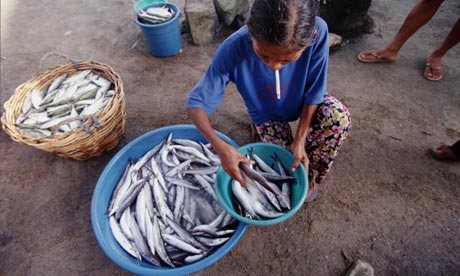Study says fish-sector players to suffer with PHL-EU trade deal

Business Mirror | 26 Jan 2014
Study says fish-sector players to suffer with PHL-EU trade deal
Written by Alladin S. Diega
IN the likelihood of a free-trade agreement (FTA) between the Philippines and European Union (EU), big processors, exporters of fish and the fish consumers in general will be the gainers, according to a recent study by the Philippine Institute for Development Studies (PIDS).
“Potential losers are the small-scale fishermen who will face lower prices for their catch due to increased competition from imported fish and small-scale fish processors and marketing agents, including women, who will also face lower prices for their products,” PIDS said in a report issued recently.
The government’s economic research arm, however, said the overall economy will experience increased fish production and improved balance of trade.
Nonetheless, the report cited the trade-off for this is that fish stocks and fish resources will be abused even further if the increased fisheries trade brought about by the FTA results to unsustainably managed exploitation.
The potential Philippine-EU FTA would include a mutual elimination of tariffs between the country and EU to increase the quantity and exports of fisheries products, according to the report.
The mutual elimination in tariffs will have mixed results, the study said, in terms of fisheries imports.
“Imports of aquaculture, pearl culture and pearl-gathering products will decrease and will improve the balance of trade, while imports of processed fish products and seaweeds will increase which will lower the balance of trade,” said the PIDS study, adding that in percentage terms, the fall in imports of fisheries products is highest among aquaculture while the increase in imports is highest for processed products.
Thus, processed products will benefit most from the FTA while aquaculture products will be disadvantaged the most, the paper explained.
The paper argues that the negative effect of freer trade on fisheries to the small fishermen is due to the structure of the chain of custody of procurement particularly for tuna exports.
Also, very few of the commercial fishers who were the primary suppliers of tuna for export processing, are owner-operators. The rest, the study said, got merely the crew share or wages that failed to see an increase because some of their catch was exported.
The importation of fish will also further affect group of women fish workers, or those selling locally caught fish in the wet markets, “because the imported fish may compete with the local fish sold by them so as a result the women may have to bear the loss from unsold fish as a consequence.”
Still, the paper noted that the bilateral reduction in tariffs in the PHL-EU FTA may lead to a reduction in commodity prices that, ergo, may see increases in real household incomes.
“As a result, the overall poverty incidence will decline from 26.3 percent to 26 percent indicating that the FTA may be poverty-reducing.”
However, the PIDS paper said the decline in the poverty gap and poverty severity will be higher than the poverty incidence, which implies that those households that are far below the poverty threshold would benefit the most from the bilateral tariff reduction.
In conclusion, the study said that freer trade could potentially worsen the exploitation of already overfished fisheries stocks and resources.
Hence, the government must implement the proper resource and environmental management that will allow sustainable exploitation even with increased fisheries trade.
The PIDS also proposes more study to allow a better analysis of the impacts of free trade on the fisheries sector, adding that research should determine not just the direction of such impacts but their magnitudes in totality, on the net, and individually for all the affected participants in fisheries and the whole economy.
Alladin S. Diega





